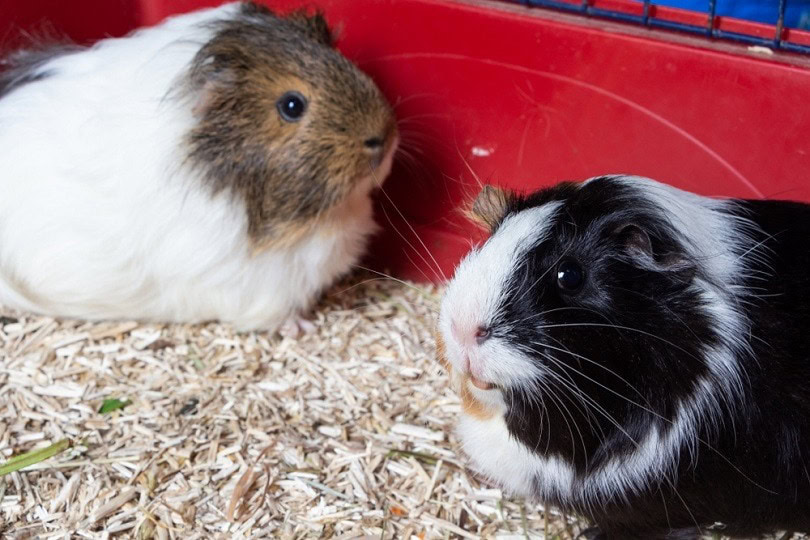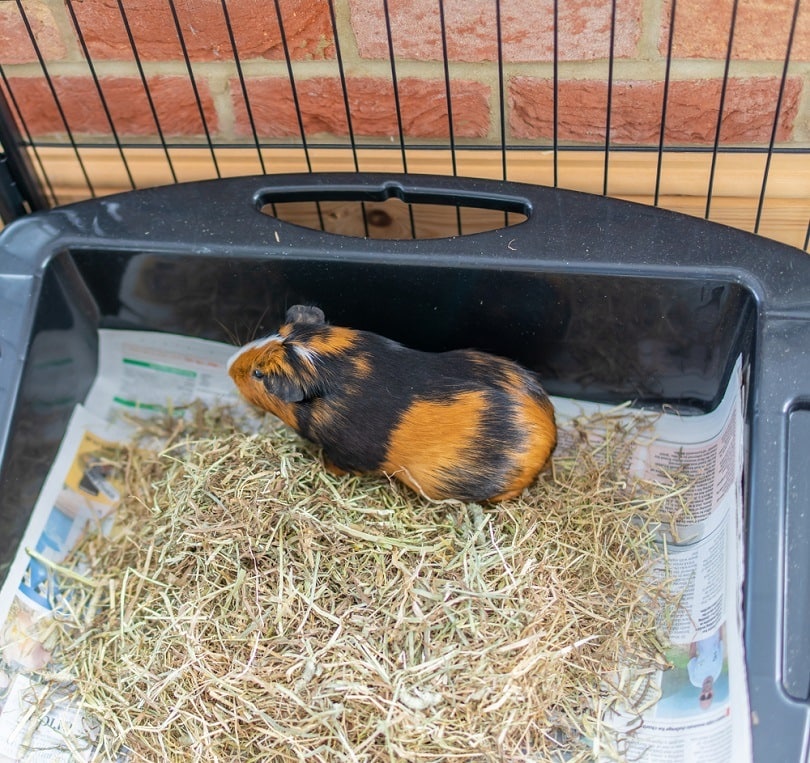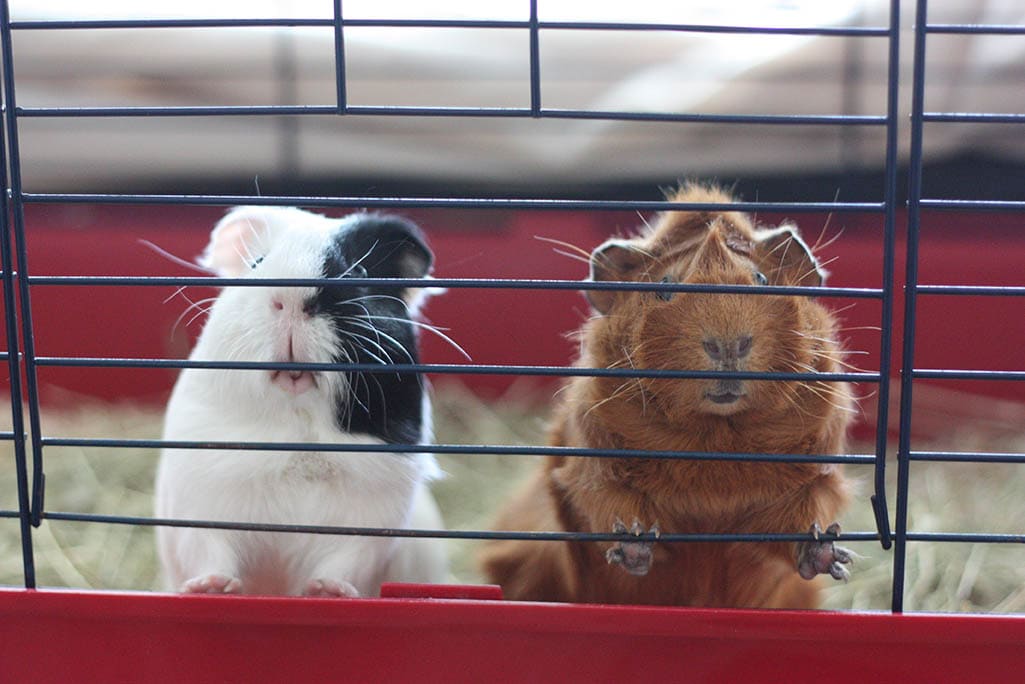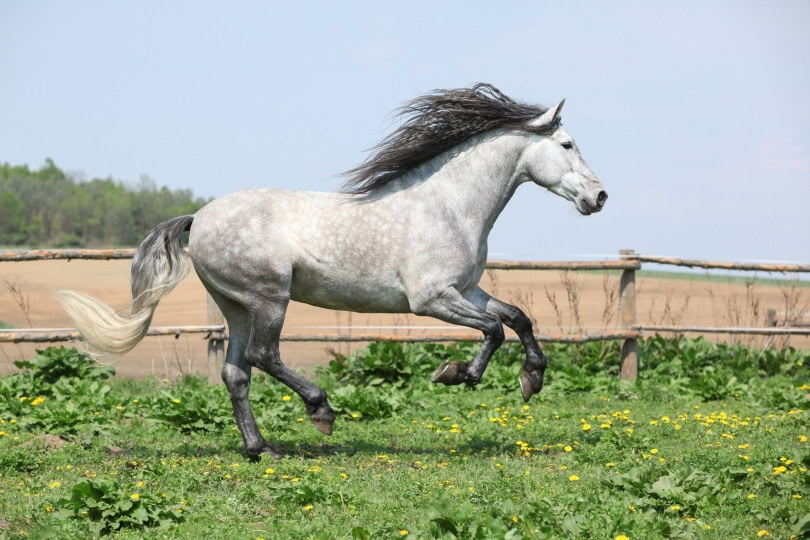Click to Skip Ahead
Guinea pigs make wonderful pets and they deserve the best treatment from their owners. It’s important to provide your guinea pig with a clean environment. This means you need to regularly clean your guinea pig’s cage to keep your cute little pet happy and healthy. While there’s no set rule regarding how often guinea pig cages must be cleaned, a good rule of thumb is to clean a guinea pig cage twice a week.

How to Clean a Guinea Pig Cage
Cleaning a guinea pig cage begins with taking the guinea pig out and putting it in a secure area. Then remove all items from the floor of the cage such as food dishes and chew sticks so you can easily remove all the bedding. Once the bedding is out, clean the inside of the cage with a pet-safe cage cleaner spray.
Alternatively, you can use a mixture of equal parts water and white vinegar. After you’ve thoroughly sprayed the cleaning solution on the floor and sides of the cage, use a clean damp rag to wipe the excess off. You may need to use a small cleaning brush to scrub the corners and any areas that are especially dirty like platforms and ladders.
It is important that every part of the cage is absolutely clean and allowed to dry thoroughly. You can speed up the drying process by using a dry cloth to remove all signs of dampness. When the cage is completely dry put in some fresh clean bedding and return the guinea pig to his cage.
You may find that your guinea pig will run around the clean cage full of excitement. Happy guinea pigs often express their joy by rapidly running and leaping in the air. This behavior is called popcorning and it’s just your guinea pig’s way of thanking you for cleaning the cage!

A Dirty Cage Can Be Life-Threatening to a Guinea Pig
A guinea pig can become sick if it is forced to live in an unclean cage. While a guinea pig won’t directly die from a dirty cage, an unclean living environment can lead to a guinea pig having health problems. If the health problems go unnoticed and untreated, they can have a seriously negative impact on your guinea pig. In the worst-case scenario, a guinea pig can die if it’s forced to live in a filthy dirty cage.
Why a Dirty Cage Is Dangerous
A dirty cage with an accumulation of dust, dirt, urine, and poop can cause respiratory problems in guinea pigs wherein they may have trouble breathing. A dirty cage can also result in the growth of harmful bacteria and fungus.
Anyone who has ever owned guinea pigs knows that they pee and poop a lot. A guinea pig should never be forced to live in its own urine and feces for a long time. Over time, urine breaks down into ammonia, which eventually starts producing a foul ammonia smell. When the smell of ammonia is present in an unclean guinea pig cage, the cage is very susceptible to the growth of mold.
Mold can produce toxins known as mycotoxins which jeopardize the life of a guinea pig. A guinea pig can both breathe in and consume mycotoxins. If the animal intakes a good amount of mycotoxins, it can suffer from respiratory failure which can damage the animal’s internal organs.


The Cage Size Matters
As one of the largest rodents kept as pets, guinea pigs need plenty of space to move around, climb, dig, burrow, and eliminate their waste. A single guinea pig should have a cage that measures at least 36”L x 30”W. Two guinea pigs should have a cage that’s at least 50”L x 30”W.
A roomier cage offers many advantages to your guinea pig and you. A guinea pig can live five to seven years under optimal conditions. They need plenty of stimulation, healthy food, ample space, and a clean living environment to thrive. If you find that your guinea pig cage is getting dirty quickly and that your guinea pig appears bored, consider getting a bigger cage.
A larger cage is much easier to clean because it prevents the build-up of waste and allows your guinea pig to separate his bathroom area from his living/play area. You wouldn’t want to live in a small confined space and neither does your guinea pig. Do your guinea pig and yourself a big favor and get a larger cage!

Conclusion
Guinea pigs require their cage to be cleaned at least two times a week to provide them with a clean and healthy environment. A clean cage is vital to their overall health and wellbeing whereas a dirty cage can lead to serious illnesses, like a respiratory infection or bacterial illnesses. A larger cage will provide your guinea pig with more space to move about, and also generate less waste per square centimeter. A clean cage will ultimately mean a better quality of life for your guinea and we hope this guide has helped with your cleaning regime.
Featured Image Credit: StineMah, Shutterstock










